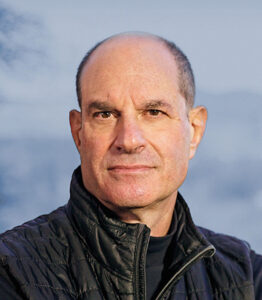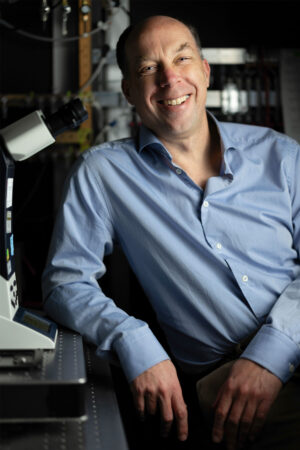
May 22, 2025
LA JOLLA—The Salk Institute welcomes two new Nonresident Fellows, UC San Francisco Professor David Julius and Stanford Professor Stephen Quake. The two scientists join a group of eminent scientific advisors who guide Salk’s leadership.

“David and Steve are amazing scientists and great partners to have on Salk’s team,” says Salk President Gerald Joyce. “These two highly decorated, world-renowned researchers have shaped their respective fields, have broad knowledge across multiple disciplines, and will be a tremendous asset in building our scientific future.”
David Julius is professor and chair of the Department of Physiology and holder of the Morris Herzstein Chair in Molecular Biology and Medicine at UC San Francisco. He received the 2021 Nobel Prize in Physiology or Medicine, together with Ardem Patapoutian, for their discoveries of receptors for temperature and touch. By looking at the biological processes activated by heat, cold, and chemical irritants, Julius makes connections between tissue injury, inflammation, and pain sensation.
Julius earned his bachelor’s degree from Massachusetts Institute of Technology, followed by a PhD in biochemistry from UC Berkeley and a postdoctoral research fellowship at Columbia University. Since joining UC San Francisco, he has earned numerous awards, including the Shaw Prize in Life Sciences and Medicine, the Canada Gairdner International Award, and the Breakthrough Prize in Life Sciences. He also belongs to the American Academy of Arts and Sciences and the US National Academies of Science and Medicine.

Stephen Quake is the Lee Otterson professor of bioengineering at Stanford University, chief science advisor at the Chan Zuckerberg Initiative, and founding president of the Chan Zuckerberg Biohub Network, a group of nonprofit research institutes. Quake is known for his many inventions, ranging from new DNA sequencing technologies to diagnostic tools, including the first ever noninvasive prenatal test for Down syndrome. His innovations have radically altered the world of biological testing and diagnostics, making medical tests safer and more efficient.
Quake started his scientific career at Stanford, where he earned his bachelor’s degree in physics and master’s degree in mathematics. He then completed his DPhil in theoretical physics at the University of Oxford. Quake has earned many honors throughout his career, including the US National Academy of Sciences’ Raymond and Beverly Sackler Prize for Convergence Research and the American Physical Society’s Max Delbruck Prize in Biological Physics. He has also been elected to many prestigious academies, including the American Academy of Arts and Sciences, US National Academy of Inventors, US National Academy of Sciences, US National Academy of Engineering, and US National Academy of Medicine.
Salk Nonresident Fellows serve as members of the faculty for renewable six-year terms. These individuals come from world-renowned academic organizations where they have achieved high levels of success in research areas that are represented at the Salk Institute. They visit Salk each year to help benchmark the Institute by advising on the scientific progress of its faculty and on the effectiveness of its existing and proposed scientific programs. The Nonresident Fellows also play a key decision-making role in the appointment and promotion of Salk faculty members.
Office of Communications
Tel: (858) 453-4100
press@salk.edu
The Salk Institute is an independent, nonprofit research institute founded in 1960 by Jonas Salk, developer of the first safe and effective polio vaccine. The Institute’s mission is to drive foundational, collaborative, risk-taking research that addresses society’s most pressing challenges, including cancer, Alzheimer’s, and agricultural resilience. This foundational science underpins all translational efforts, generating insights that enable new medicines and innovations worldwide.